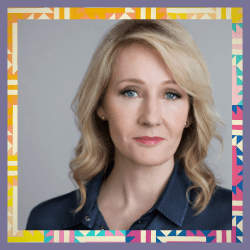
From an early age, I loved to escape explore through books. My girlhood heroine was J.K. Rowling. My mother – a teacher – had come across Harry Potter and the Philosopher’s Stone not long after it came out. I was a toddler then and now can’t remember a time when I didn’t know Harry Potter. I grew up with Harry, reading books full of magic, friendship and the triumph of good.
And J.K. Rowling had not only constructed an entire, magical world, but she had done so from within great difficulty and with great success. Harry Potter found its way from idea to manuscript while J.K. Rowling was a single mother, with a restraining order against her ex-husband, a diagnosis of clinical depression and no money other than state benefits to keep her and her child afloat. It provided a means to channel her grief after the death of her mother, an escape from the world in which she felt like a failure and a chance to spread a message of hope. It was not, however, immediately popular. Although she got a literary agent, all twelve publishers to whom her agents submitted the manuscript initially refused it. J.K. became “J.K.” because her eventual publisher recommended she hide her femininity so that boys would read her book. But when it was published, it proved a great success, with boys, girls and even adults. There were films, games, stickers and even branded sweets. There was once no treat quite like sharing a Dumbledore-clad packets of lemon sherbets with my sister while my mum sorted out the shopping.
It was inspirational to me as a child that someone who had struggled with so much could create anything like Harry Potter. It gave me hope that I could too. While my classmates aspired to be astronauts, footballers and pop stars, I answered consistently “I’m going to be an author.” As I’ve got older, my aspirations have changed but the almost myth-like story of J.K. Rowling’s life has sustained me in different ways. Now, when I struggle with my mental health or feel like a failure, I remember that these things were instrumental in one of the greatest cultural achievements I’ve known.
They say you should never meet your heroes. The message there, I think, is that they will prove to be limited humans, not mythical figures. In recent years, many fans have felt let down by J.K. Rowling’s decisions and by the limits of representation within a magical world that no longer seems quite so progressive. I believe this is important to address, but for me,, it need not dim the hope I find in J.K.’s previous achievements: if she could do it, then I can. As she once said, “we carry all the power we need inside ourselves already”.
-Sophie Small
Junior Girl
Girl Museum Inc.
